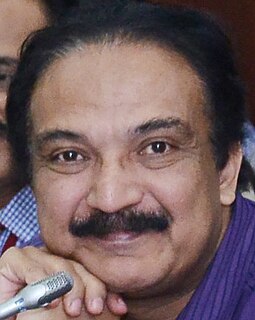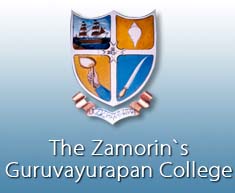
The Zamorin's Guruvayurappan College is an aided college in Kozhikode, Kerala, India offering graduation and post-graduation courses. It is affiliated to the University of Calicut.

Thunchaththu Ramanujan Ezhuthachan was a Malayalam devotional poet and linguist from around the 16th century. Today he is known as the father of modern Malayalam language – the principal language of the Indian state Kerala and the union territory of Lakshadweep – and its literature.

Guruvayur Sri Krishna Temple is a Hindu temple dedicated to the Hindu god Guruvayurappan, located in the town of Guruvayur in Kerala, India. It is one of the most important places of worship for Hindus of Kerala and is often referred to as Bhuloka Vaikunta, which translates to as "Holy Abode of Vishnu on Earth".
Achyutha Pisharodi was a Sanskrit grammarian, astrologer, astronomer and mathematician who studied under Jyeṣṭhadeva and was a member of Madhava of Sangamagrama's Kerala school of astronomy and mathematics. He is remembered mainly for his part in the composition of his student Melpathur Narayana Bhattathiri's devotional poem, Narayaneeyam.
Sengalipuram Anantarama Dikshitar was a Śrauti scholar and also was a great exponent of the art of upanyasas (discourses) on various subjects in Hinduism. Born in the Thanjavur district as the second son to Sri Subramanya Dikshithar, boy Anantharaman was initiated into the learning of the Vedas under his father Subramanya Dikshithar who was also known as chinna Muthannaval brother of Sengalipuram Vaidhyanatha Dikshithar or Periya Muthannaval. Paruthiyur Krishna Sastri was the first guru for Anantharama Dikshithar. He first had his Aksharabyasam from Krishna Sastri at Muthannavals’s Gurukulam. Then he further studied other Shastras and Vedangas from eminent scholars of repute, astrology from Kadalangudi Natesa Sastrigal who also was his father in law.

The Aranmula Parthasarathy Temple is one of the "Divya Desams", the 108 temples of Vishnu revered by the 12 poet saints, or Alwars located near Aranmula, a village in Pathanamthitta District, Kerala, South India. Constructed in the Kerala style of architecture, the temple is glorified in the Divya Prabandha, the early medieval Tamil canon of the Azhwar saints from the 6th–9th centuries AD. It is one of the 108 Divyadesam dedicated to Krishna, an avatar of Vishnu, who is worshipped as Parthasarathy. The nearest railway station to the temple is located in Chengannur, while the nearest airport is Trivandrum International Airport.
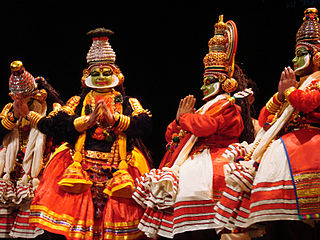
Krishnaattam is a temple art in Kerala, India. It is a dance drama and presents the story of Krishna in a series of eight plays and was created by Manaveda, the then Zamorin Raja of Calicut in northern Kerala. The eight plays are: Avataram, Kaliyamardanam, Rasakrida, Kamsavadham, Swayamvaram, Banayuddham, Vividavadham and Swargarohanam. It survives in its glory at the Guruvayur Sri Krishna temple.
Narayaniyam is a medieval Sanskrit text, comprising a summary study in poetic form of the Bhagavata Purana. It was composed by Melpathur Narayana Bhattathiri, one of the celebrated Sanskrit poets in Kerala. Even though the Narayaneeyam was completed as early as 1586 AD, it appeared in print only after more than 250 years. The Bhagavata Purana is a major Hindu scripture consisting of about 18,000 verses, mainly devoted to the worship of Krishna.
Jnanappana is a devotional poem written by the 16th century Malayalam poet Poonthanam. This poem written as a devotional prayer to Guruvayoorappan is considered as an important work in Malayalam literature. Written in simple Malayalam, the Jnanappana was Poonthanam's magnum opus and is an important work of Bhakti literature from Kerala and is revered for its poetic merit and intensity of devotion.

Anandavalleeswaram Sri Mahadevar Temple in Kollam city is one of the ancient Hindu temples in Kerala, India. Lord Siva and Goddess Anandavally are the main deities of the temple. According to folklore, sage Parashurama has installed the idol of Lord Shiva. The temple is a part of the 108 famous Shiva temples in Kerala. It is located at Anandavalleeswaram, a major neighborhood of Kollam city, that comes to the west side of Kollam Collectorate.

Hinduism is the largest religion in Kerala and Hindu castes together make up 54% of the population of the state according to the 2011 census.

Keezhattur is a village in Malappuram district in the state of Kerala, India. Poonthanam illam, the birthplace of "bhakthakavi" Poonthanam namboothiri, famous ancient Malayalam poet, is located here. The poonthanam illam is now a popular cultural centre. Keezhattur is a moderately large panchayat.The major place in keezhattur panchayat is kizhattur.'kizhattur pooram' is the major festival in keezhattur. Its administrative offices are located in Akkaparambu, which is about 12 km away from Perinthalmanna, the largest city of Malappuram district.
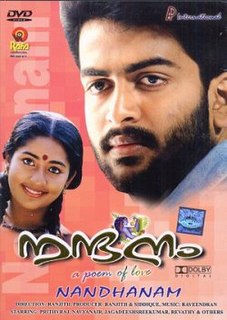
Nandanam is a 2002 Malayalam film co-produced, written, and directed by Ranjith, starring Navya Nair and Prithviraj Sukumaran along with Kaviyoor Ponnamma, Revathi, and Aravind Akash. Singer K. J. Yesudas made a cameo appearance. The music was composed by Raveendran. It was the debut film of actor Prithviraj.
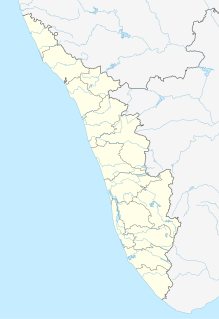
Thottuva Dhanwanthari temple is a Hindu temple located in Thottuva, Kerala, India.
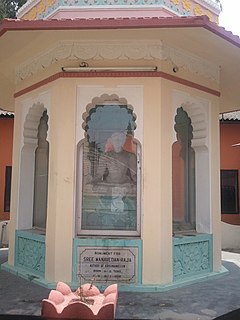
Manaveda (Malayalam മാനവേദന്, the Zamorin Raja of Calicut in northern Kerala is renowned as author of Krishnanattam.It is a dance drama and presents the story of Krishna in a series of eight plays.
Guruvayur Maraprabhu is a 54 feet (16 m) terracotta statue located at the Sreevalsam Guest House Complex in Guruvayur, Kerala, India. It is a creative interpretation of lord Guruvayurappan.




